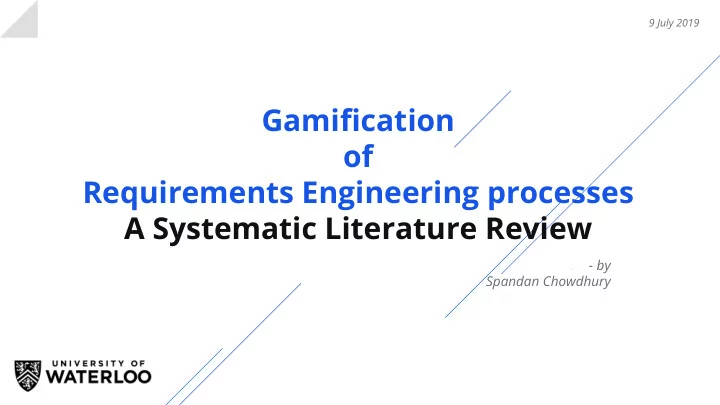

9 July 2019 Gamification of Requirements Engineering processes A Systematic Literature Review - by - Spandan Chowdhury
“I never race for records. The motivation to try to beat the record is not enough to continue. You have to enjoy it.” - Valentino Rossi -
Outline - Introduction - Why? - What? - Methodology - Results - Conclusions - Future work - Related work
Why? - Requirements Elicitation is the starting point of Requirements Engineering (RE) - 55% of troubles in CBS can be traced back to the requirements elicitation process. 82% of engineering efforts go into correcting these mistakes - Only key stakeholders take part in the elicitation process - User involvement is important for success of projects - Motivating users to talk about the requirements is necessary - Gamification could be used to address this problem
What? - Gamification is the use of game design and game elements in non-game scenarios like health, training etc. - Why are researchers suggesting gamification in RE, and what goals can be achieved through it? - Is it a good idea? Is it showing good results? - What is the future of gamification in RE?
Methodology - Strong correlation between highly-cited documents and the position of the documents in the search results - Better than the paid databases like Scopus and Compendex in discovering citations in engineering subjects including computer science - Easy to use search APIs like scholarly
..Methodology gamification gamify requirements elicitation requirement elicitation gamifying elicitation of requirements Gamification AND gamified eliciting requirements game-based elicit requirements game based requirements elicitation requirements engineering requirements identification requirements specification requirements analysis requirements validation requirements management requirements verification requirements negotiation requirements documentation requirements modeling requirements prioritization requirements source
..Methodology Reviewing Excluded Search Results • 13 papers on • 35 papers • Non-RE processes Gamification of • Not in English RE processes (6 • Thesis or completed) Technical Report • Unpublished • Literature Review
..Methodology Manual Verification of search results
RQ1: Why is gamification needed? - Failures in requirements elicitation - Key stakeholders do not know everything - Interviews and group-works help, but they have limitations - Voluntary involvement. No incentives - Active participation, competition - Collaboration, communication, endorsements - Better understanding of requirements
RQ2: What methods of gamification are suggested? - Points, Badges and Leaderboards Gamification Suggestions 6 - Rewards, roles (six thinking hats), stories, levels/progression, social pressure, 5 5 challenges, activity feeds, video animation, 4 facial animation, access, votes, comments, 3 3 branches, and groups 2 2 1 1 1 1 0
RQ3: Is gamification leading to higher stakeholder participation? - Treatment groups produced more attractive and indifferent requirements - Better quality requirements according to INVEST - Discussion helped in coming up with new requirements - Fun, interesting, and engaging according to participants - No proof of higher number of participants because of gamification - No proof of product success using the requirements
RQ4: Does gamification work in the long run? - Very few number of participants - Experiment durations were very short - Experiments were conducted for one product only - Researchers do not mention effectiveness of gamification based on type of application - No long-term study
RQ5: Future research in gamification of RE - Use of visualizations and creating a virtual world - Game elements other than PBL - Better assignment of points - Rewards that matter - Motivating users in different ways - Leveraging personality types - Using psychometrics to validate user satisfaction, behavior, and happiness - Could boring be recreational? - Combining differently worded requirements
Conclusions - Gamification is suggested primarily for elicitation of requirements - Gamifying RE processes does not lead to worse results - Participants seem to like it - Gamification in RE has not got traction yet as there are not many researchers working on it. First paper in 2012 - A lot needs to be explored regarding the effect of separate gamification elements on players - Long-term experiments on multiple projects are needed to understand if there are long term advantages of gamification
Future work - Utilize a broader search methodology to select research studies - Look for gamification methods as well as experiments conducted in other areas and compare them to RE gamification - Explore the psychology of games and gamification - Explore the contexts in which gamification works
Related Work R. Cursino, D. Ferreira, M. Lencastre, R. Fagundes, J. Pimentel, Gamification in Requirements Engineering: a Systematic Review, in 2018 International Conference on the Quality of Information and Communications Technology , Sep. 2018, pp. 119-125. DOI= https://doi.org/10.1109/QUATIC.2018.00025
References C. Ribeiro, C. Farhina, J. Pereira, M. M. da Silva, Gamifying requirement elicitation: Practical implications and outcomes in improving stakeholders collaboration. Entertainment 1 Computing 5.4 (2014), pp. 335-345. DOI= http://dx.doi.org/10.1016/j.entcom.2014.04.002 M. Z. H. Kolpondinos, M. Glinz, Behind Points and Levels – The Influence of Gamification Algorithms on Requirements Prioritization, in 2017 IEEE 25 th International Requirements 2 Engineering Conference, Sep. 2017, pp. 332-341. DOI=https://doi.org/10.1109/RE.2017.59 R. Snijders et al. , Refine: A gamified platform for participatory requirements engineering, in Crowd-Based Requirements Engineering, Aug. 2015, pp. 1-6. 3 DOI=https://doi.org/10.1109/CrowdRE.2015.7367581
Thank You
Recommend
More recommend